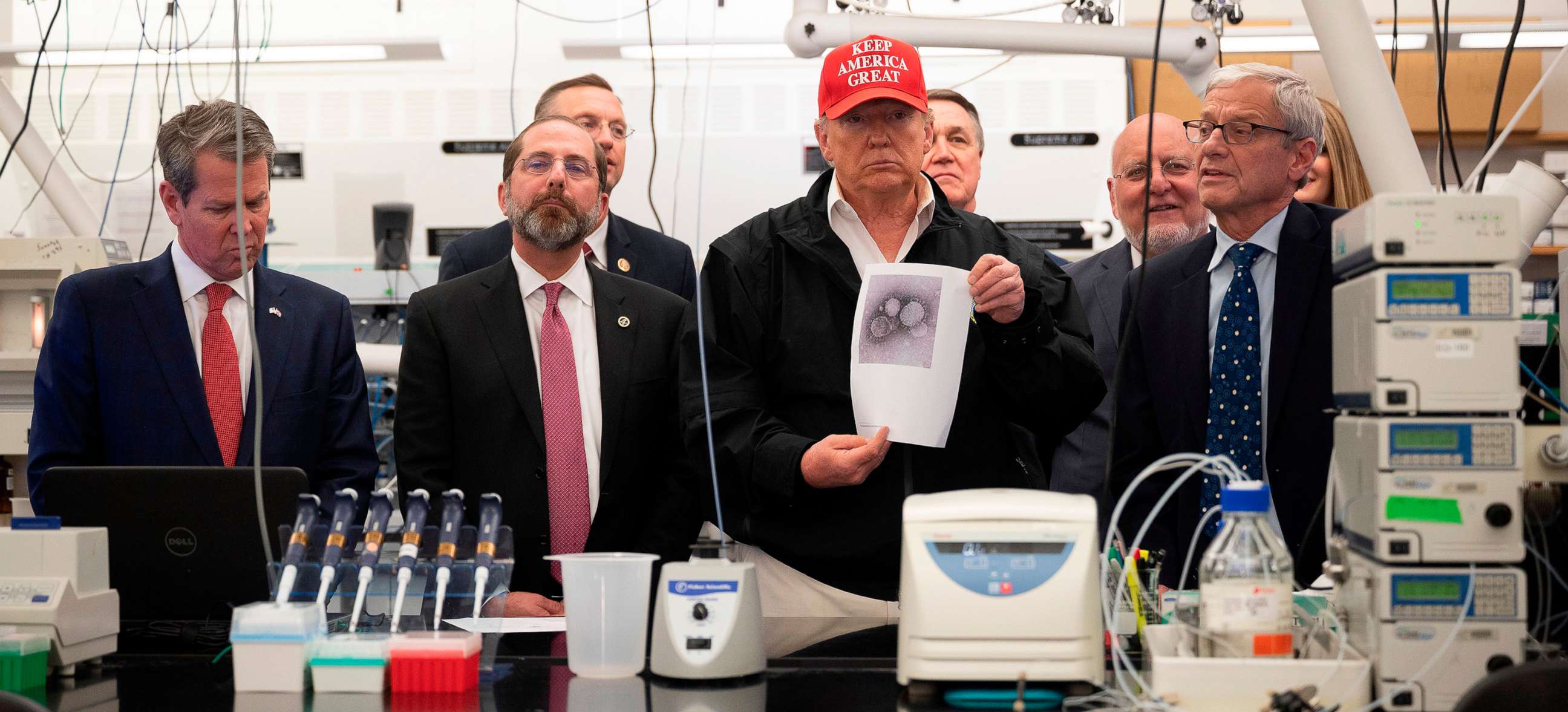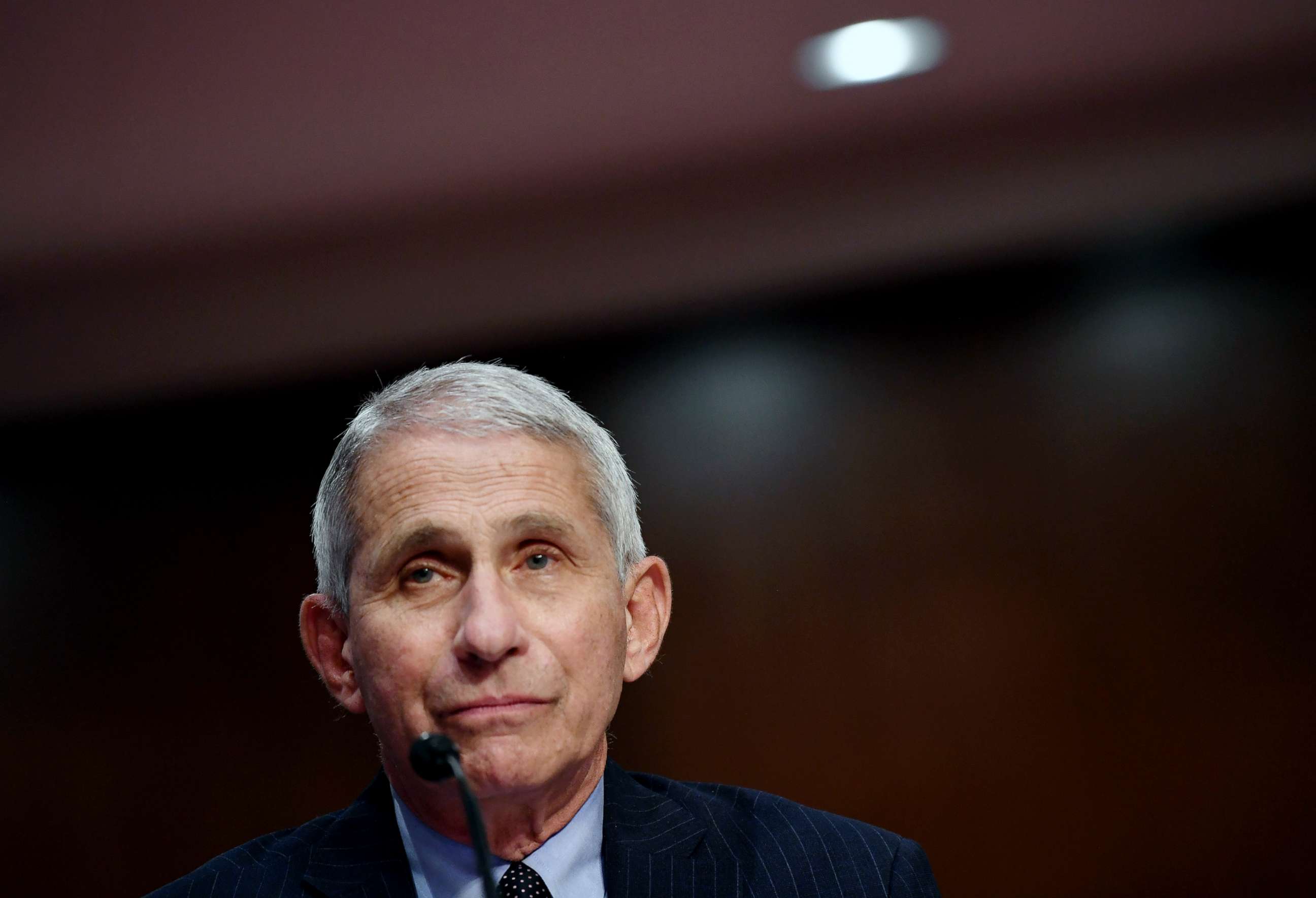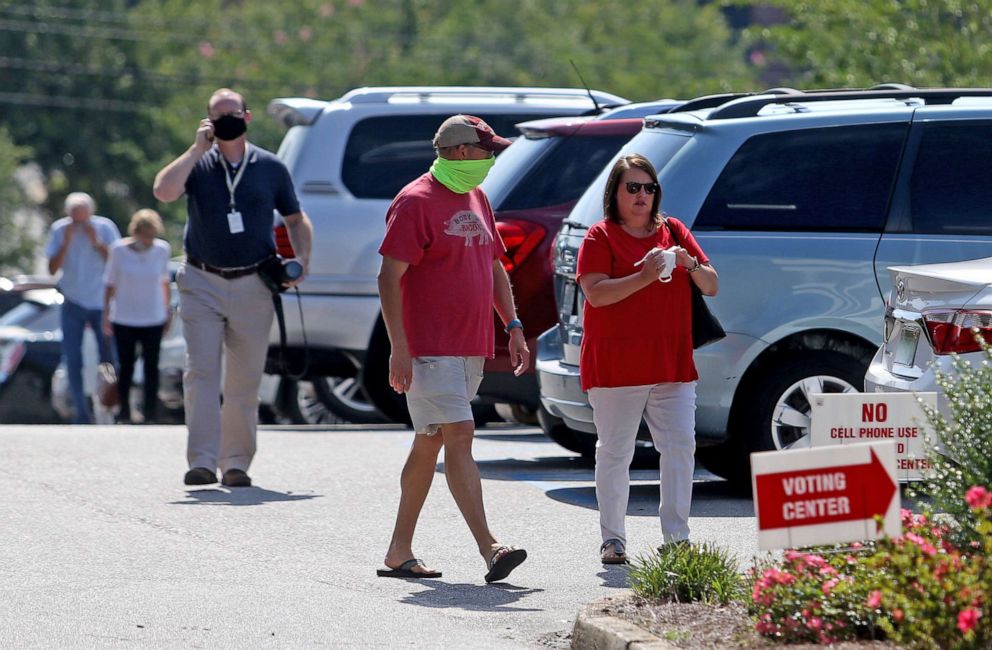The Note: Map continues to expand for Biden, Senate Democrats
The 2020 landscape looks different than it did before the COVID-19 crisis.
The TAKE with Rick Klein
A time of deep pessimism in the country has grown into one of quiet -- and sometimes not-so-quiet -- optimism among Democrats.
After a meandering and biting appearance in the Rose Garden on Tuesday, President Donald Trump touches down in Atlanta on Wednesday to talk up -- wait for it -- infrastructure knowing that Georgia has solidified as a battleground state.
The state also happens to feature two Senate races this year, including one where intra-party sniping is expected to continue all the way through November.
Federal Election Commission filings due out Wednesday appear likely to tell a story of a growing fundraising edge for Democrats, putting more congressional races -- even in deep-red states -- in potential play.
Back at the top of the ticket, former Vice President Joe Biden's campaign is now is on the air with an ad buy in Texas, a state that hasn't been won by a Democratic presidential candidate in 44 years and where presidential-level investment has Democrats buzzing. Biden is also staffing up in, among other places, Arizona, which has supported a Democrat for president only once since 1952.

Biden told a group of journalists this week that he would consider eliminating the filibuster in the Senate, a sign of optimism about Democratic control. He said he could see his party securing 55 seats in the Senate; that would be a net pick-up of seven -- a threshold few strategists saw as remotely realistic coming into the cycle.
Many Democrats are keeping themselves from thinking big, in terms of either the Senate or the presidential map, based on memories of 2016 and more. Trump's long campaign-style speech and Q&A is a reminder that he can still have the loudest voice in any room.
But the 2020 landscape looks different than it did before the COVID-19 crisis, and even different than it did a few weeks ago. Democrats are fine with Trump talking, as they act to expand the map.
The RUNDOWN with Alisa Wiersema
"Dangerous" and "decrepit" is how former Health and Human Services Secretary Kathleen Sebelius described the Trump administration's handling of the coronavirus pandemic on a call with reporters Tuesday. Sebelius -- who grappled with the H1N1 pandemic during President Barack Obama's tenure -- is one of a chorus of health experts who have recently issued warnings about the dangers of inserting partisanship into science.
"We need to make it clear to the American public that this is a very dangerous path that we are on and deaths will continue to rise unless we do something right away, which is to begin to lock the country back down and get to the point where we can actually get under control," Sebelius said.
That warning comes on the heels of Trump administration officials making the remarkable move of sending reporters information that criticizes Dr. Anthony Fauci as if he was a political rival rather than a member of the president's team.

On Sunday, one of Trump's senior aides, Dan Scavino, posted a cartoon that depicts Fauci as a water faucet spewing phrases like "No NFL season!" and "Shut up and obey!" The following day, White House press secretary Kayleigh McEnany denied that the White House is dumping opposition research on the nation's top infectious disease expert and even claimed the president and Fauci have a "very good working relationship” and added that “there’s no opposition research being dumped to reporters.”
"We have a White House, who is now trying to undercut his credibility," Sebelius said. "And if you fast forward that undercutting to when -- God to help us -- we have a safe and effective vaccine and the American public do not believe that they can trust the public health officials, no one is going to be vaccinated. We will have the same partisan divide and we will be dealing with coronavirus for decades."
During an event hosted by Georgetown University on Tuesday, Fauci said, "it's difficult" when asked who the public should trust.
"I believe, for the most part, you can trust respected medical authorities. You know, I believe I'm one of them. So I think you can trust me. But I would stick with respected medical authorities," Fauci said.
The TIP with Kendall Karson
To mask or not to mask has become one of the most partisan debates in the country. On Tuesday, as in-person voting got underway in Texas, the partisan split over face coverings forced some poll workers to abandon their posts to protect their health.
When Cynthia Riley arrived at Clark High School in Plano, 20 miles north of Dallas, on Tuesday for her 14-hour shift as a poll worker, she was met by some colleagues who were refusing to wear masks at the polling site. Riley, who was recruited by the Democratic Party, said that the Republican presiding judge who runs the polling site for the party, along with three or four election clerks, who were drafted by the county GOP, showed up without masks. (In the state, Gov. Greg Abbott’s mask mandate exempts voting sites and churches.)

"If these yahoos don't want to wear a mask, okay," she said. "I should not be forced to be around them to be able to do what I agreed to do." But it wasn't just an issue at her site. At another polling location in Plano, Allison St. Claire, a poll worker, also found with similar resistance from some of the other clerks who declined to wear face covers at the Plano Mosque, known as the Islamic Association of Collin County. She, too, said that at her polling location, three poll workers, recruited by the local Republican Party, "flagrantly" refused to wear masks.
Less than four months from November, with concerns and problems racking up for officials conducting elections during the pandemic, both Riley and St. Claire are adding another to the list, imploring state officials to tackle the hurdles before the fall when far more voters are expected to come to the polls.
"This is just the tip of the iceberg and I just think it's unfair to expect people to be election workers and not be able to have some control over their safety," Riley said.
THE PLAYLIST
ABC News' "Start Here" podcast. Wednesday morning's episode features a conversation with fourth grade teacher Meghan Hanrahan, who tells us why she and many of her colleagues are feeling anxious about how officials are handling a possible return to the classroom in the fall. Then, ABC News Political Director Rick Klein explains how dividing lines in the Republican party are playing out in down ballot races in Southern states. And, ABC News' Deborah Roberts tells us about her emotional conversation with mothers whose children were killed by police. http://apple.co/2HPocUL
ABC News' "Powerhouse Politics" podcast. Maryland Gov. Larry Hogan talks with ABC News Political Director Rick Klein and Chief White House Correspondent Jonathan Karl. https://bit.ly/2w091jE
FiveThirtyEight Politics Podcast. After more than two months of decline, the number of Americans dying from COVID-19 is increasing. In this installment of the FiveThirtyEight Politics podcast, the crew discusses how Americans think the U.S. should respond to this crisis and whether President Trump and other politicians are in agreement. They also explore a lesson some Democrats took away from the 2016 election — that the party should focus less on identity politics. https://53eig.ht/3iWoV5g
WHAT YOU NEED TO KNOW TODAY
Download the ABC News app and select "The Note" as an item of interest to receive the day's sharpest political analysis.
The Note is a daily ABC News feature that highlights the key political moments of the day ahead. Please check back tomorrow for the latest.




